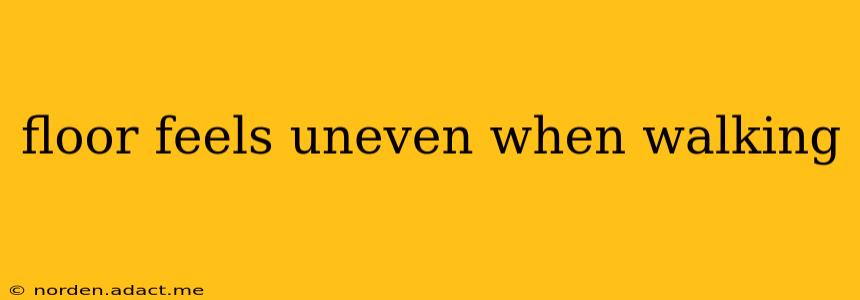Walking on an uneven floor is not only uncomfortable but can also be a safety hazard. This issue can stem from various causes, ranging from simple fixes to more significant structural problems. This comprehensive guide will help you diagnose the problem and find the best solution.
Why Does My Floor Feel Uneven?
Uneven floors are a common problem, and the underlying cause can vary greatly depending on the type of flooring and the age of your home. Here are some of the most frequent culprits:
- Subfloor Issues: This is often the primary cause. The subfloor, the layer beneath your finished flooring, might have settled, warped, or become damaged over time. This is particularly common in older homes or those built on unstable ground.
- Improper Installation: Incorrect installation of the subfloor or finished flooring can lead to unevenness. This includes gaps between boards, uneven distribution of adhesive, or insufficient support.
- Moisture Damage: Excess moisture can cause wood subfloors to swell, warp, and become uneven. Leaky pipes, high humidity, or poor ventilation can contribute to this problem.
- Age and Wear: Over time, floors naturally experience wear and tear. This can manifest as sagging, creaking, and an overall uneven feel.
- Foundation Problems: In severe cases, uneven floors can indicate more serious structural issues with the foundation of your home. This requires the attention of a structural engineer.
- Shifting Soil: Changes in soil conditions beneath your home, such as settling or expansion, can also lead to uneven floors.
How Can I Fix an Uneven Floor?
The best approach to fixing an uneven floor depends entirely on the cause and severity of the problem. Minor unevenness might be easily addressed, while more significant issues will require professional help.
1. Identifying the Source of the Problem:
Before attempting any repairs, carefully inspect your floor. Look for:
- Visible Gaps or Separations: Check for spaces between floorboards or tiles.
- Sagging or Dips: Feel for areas where the floor dips noticeably.
- Squeaking or Creaking: These sounds often indicate loose boards or structural issues.
- Visible Water Damage: Check for signs of water stains, swelling, or mold.
2. Minor Unevenness: DIY Solutions
For slight unevenness, these solutions might suffice:
- Sanding: If you have hardwood floors, sanding can level minor imperfections. This is best left to professionals for larger areas or significant unevenness.
- Floor Levelers: These compounds can be used to fill in minor dips and level out the surface before installing new flooring.
- Replacing Damaged Boards (Wood Floors): If individual boards are damaged, replacing them can restore evenness. This requires some DIY skills and tools.
3. Significant Unevenness: Professional Help
If the unevenness is severe or you're unsure how to tackle the problem, it's best to consult a professional:
- Structural Engineer: If you suspect foundation problems, a structural engineer can assess the situation and recommend solutions.
- Contractor: A general contractor can handle more extensive repairs, such as subfloor replacement or foundation work.
- Flooring Specialist: A flooring professional can diagnose the problem and suggest appropriate repairs or replacement options.
What Causes Uneven Hardwood Floors?
Uneven hardwood floors often result from issues with the subfloor, improper installation, or moisture damage. Older homes are particularly susceptible due to age and wear, while new installations can suffer from errors during the process.
How Do I Fix Uneven Tile Floors?
Fixing uneven tile floors is more involved than repairing hardwood floors and often requires professional assistance. The process usually involves removing the damaged tiles, leveling the subfloor, and reinstalling the tiles.
Can I Level a Floor Myself?
You can level a floor yourself for minor unevenness using floor levelers, but major unevenness requires professional help. Attempting extensive repairs without experience can worsen the problem.
When Should I Call a Professional for Uneven Floors?
Call a professional if the unevenness is significant, you suspect foundation problems, or you're unsure how to address the issue. Professional help ensures the problem is correctly diagnosed and repaired effectively.
This guide provides a comprehensive overview of dealing with uneven floors. Remember to prioritize safety and seek professional assistance when needed. By carefully evaluating the problem and following the appropriate steps, you can restore the levelness and comfort of your floors.
